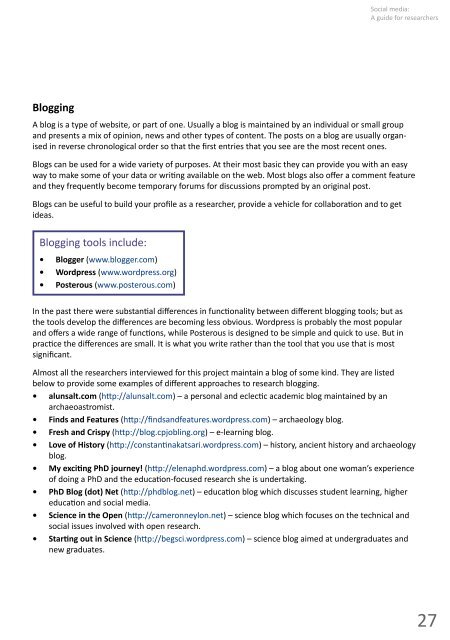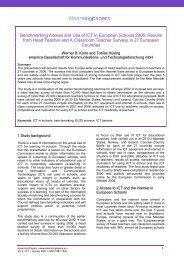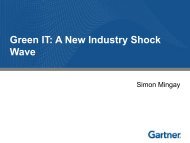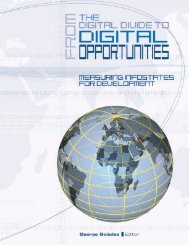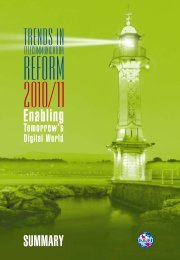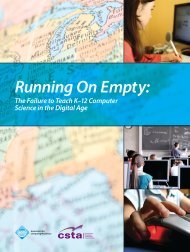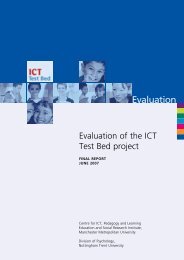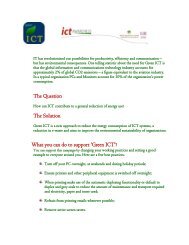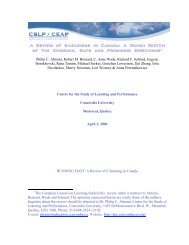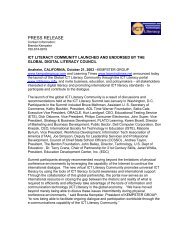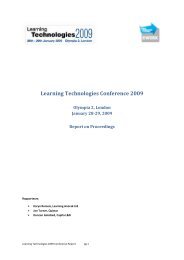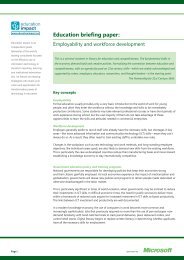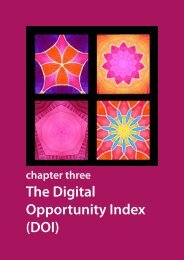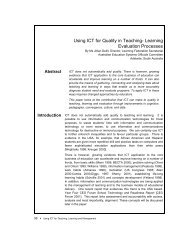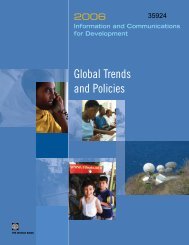Social Media - A guide for researchers - ICT Digital Literacy
Social Media - A guide for researchers - ICT Digital Literacy
Social Media - A guide for researchers - ICT Digital Literacy
You also want an ePaper? Increase the reach of your titles
YUMPU automatically turns print PDFs into web optimized ePapers that Google loves.
<strong>Social</strong> media:<br />
A <strong>guide</strong> <strong>for</strong> <strong>researchers</strong><br />
Blogging<br />
A blog is a type of website, or part of one. Usually a blog is maintained by an individual or small group<br />
and presents a mix of opinion, news and other types of content. The posts on a blog are usually organised<br />
in reverse chronological order so that the first entries that you see are the most recent ones.<br />
Blogs can be used <strong>for</strong> a wide variety of purposes. At their most basic they can provide you with an easy<br />
way to make some of your data or writing available on the web. Most blogs also offer a comment feature<br />
and they frequently become temporary <strong>for</strong>ums <strong>for</strong> discussions prompted by an original post.<br />
Blogs can be useful to build your profile as a researcher, provide a vehicle <strong>for</strong> collaboration and to get<br />
ideas.<br />
Blogging tools include:<br />
• Blogger (www.blogger.com)<br />
• Wordpress (www.wordpress.org)<br />
• Posterous (www.posterous.com)<br />
In the past there were substantial differences in functionality between different blogging tools; but as<br />
the tools develop the differences are becoming less obvious. Wordpress is probably the most popular<br />
and offers a wide range of functions, while Posterous is designed to be simple and quick to use. But in<br />
practice the differences are small. It is what you write rather than the tool that you use that is most<br />
significant.<br />
Almost all the <strong>researchers</strong> interviewed <strong>for</strong> this project maintain a blog of some kind. They are listed<br />
below to provide some examples of different approaches to research blogging.<br />
• alunsalt.com (http://alunsalt.com) – a personal and eclectic academic blog maintained by an<br />
archaeoastromist.<br />
• Finds and Features (http://findsandfeatures.wordpress.com) – archaeology blog.<br />
• Fresh and Crispy (http://blog.cpjobling.org) – e-learning blog.<br />
• Love of History (http://constantinakatsari.wordpress.com) – history, ancient history and archaeology<br />
blog.<br />
• My exciting PhD journey! (http://elenaphd.wordpress.com) – a blog about one woman’s experience<br />
of doing a PhD and the education-focused research she is undertaking.<br />
• PhD Blog (dot) Net (http://phdblog.net) – education blog which discusses student learning, higher<br />
education and social media.<br />
• Science in the Open (http://cameronneylon.net) – science blog which focuses on the technical and<br />
social issues involved with open research.<br />
• Starting out in Science (http://begsci.wordpress.com) – science blog aimed at undergraduates and<br />
new graduates.<br />
27


